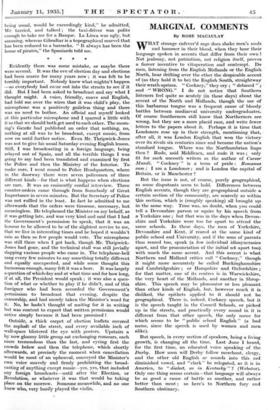MARGINAL COMMENTS
By ROSE MACAULAY
WilT strange enfever'd rage does shake men's souls and hammer in their blood, when they hear their language spoken in accents that differ from their own Not jealousy, not patriotism, not religion itself, proves a fiercer incentive to vituperation and contempt. Do men, listening from the English Midlands or the English • North, hear drifting over the ether the despicable accent of (as they hold it to be) the English South, straightway their wrath uprises. " Cockney," they cry ; " debased " ; and -" WRONG." I do not notice that Southern listeners feel quite so acutely (in these days) about the accent of the North and Midlands, though the use of this barbarous tongue was a frequent cause of bloody • battles between mediaeval university undergraduates. Of course Southerners still know that Northerners are wrong, but they are a more placid race, and write fewer letters to the papers about it. Perhaps it is time that Londoners rose up in their strength,- mentioning that, after all, it was London English that won the victory over its rivals six centuries since and became the nation's standard tongue. Where was the Northumbrian lingo then ? Rude, said Middlesex, and rude it was ; only fit for such uncouth writers as the author of Cursor Mundi. " Cockney " is a term of pride : Romanus sum ; I am a Londoner ; and is London the capital of Britain, or is Manchester ?
But the issue is not, of course, purely geographical, as some disputants seem to hold. Differences between English accents, though they are geographical outside a certain section of the community, are scarcely so within this section, which is (roughly speaking) all brought up in the same way.. Time was, no doubt, when you could, tell a Devonshire parson or squire by his speech from a Yorkshire one ; but that was in the days when Devon- shire and Yorkshire were too far apart to attend the same schools. In these days, the men of Yorkshire, Devonshire and Kent, if reared at the same kind of public school and University, and if the sons of parents thus reared too, speak (a few individual idiosyncrasies apart, and the pronunciation of the initial wh apart too), with much the same accent. And this accent is what Northern and Midland critics call " Cockney," though it might more accurately be called Buckinghamshire and Cambridgeshire ; or Hampshire and Oxfordshire ; for that matter, one of its centres is in Warwickshire, the very heart of the Midlands, and another in Shrop- shire. This speech may be pleasanter or less pleasant than other kinds of English, but, however much it is, disliked, the epithets applied to it should not be geographical. There is, indeed, Cockney speech, but it is the speech taught in the Council Schools, or picked up in the streets, and practically every sound in it is different from that other speech, the only name for which seems to be " public school English " (a bad name, since the speech is used by women and men alike).
But speech, in every section of speakers, being a living growth, is changing all the time. Last June I heard, for the first time, an educated voice speaking of the Durby. How soon will Derby follow merchant, clergy, and the other old English ar sounds into this sad diminished vowel, and "clark" be relegated, as it is in America, to " dialect, as in Kentucky " ? (Webster). Only one thing seems certain—that language will always be as good a cause of battle as another, and rather better than - most ; so here's to Northern fury and Southern obstinacy.






































 Previous page
Previous page